Tips for High School Graduates Considering College
Reader Interest Poll
What attracted you to this article?
Looks Nice! Looks Expensive, too...

Is college worth it?
Many people have this question after graduating from high school, I definitely did. It is certainly a good question to have and I hope this article helps you answer it.
First of all ask yourself... "Do I want to be successful?"
If you want to be successful, you have to put in the effort!
True success, you will find, does not come from money. Instead, it comes from fulfillment; and that fulfillment comes when people are doing something they are passionate about.
The purpose of this article is to help high school graduates consider whether a college education can help them attain success; and if so, how they take full advantage of it.
To start us off... view father Guido Sarducci's humorous take on college education
Rising Cost of College
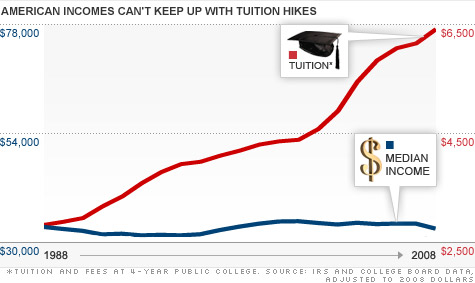
The Downsides of College
- College is very expensive, and it continues to become more so.
- College is not always necessary, some of the most successful people in the world (including Bill Gates and Steve Jobs) never attended or dropped out of college.
- A degree is not always valuable in today's job market.
- College takes a lot of time; and in order to stay competitive in the job market it is often necessary to go to graduate school after completing an undergrad.
- The core classes are unnecessary, yet in most cases they are required. (My opinion, see below!!!)
The first year to year and a half of college is virtually the same for every degree program. Its purpose is to teach students things that "everyone should know". Isn't that what high school is for? Because of the core curriculum, a computer science major is required to take humanities, personal exercise, history classes, and other classes completely unrelated to their field of interest.
I see the core curriculum as a ridiculous waste of time and money. Students should be able to focus on gaining an education that will benefit them in their field of interest. In addition, if a person is not interested in learning something, they will normally not enjoy learning it. And once they no longer need the information for the class, they will most likely forget it.
The Wrong Reasons to Attend College
- "I want to party!"
- "A degree will look good on my resume"
- "All my friends are attending college"
- "My parents want me to attend college"
- "I got a scholarship to attend college"
- "I want to become independent, and college is a good place to do that"
Unfortunately, many people have one or more of these reasons in mind when they head off to college… and this (coupled with the fact that few students take advantage of campus resources and do not get involved) is probably why the current college dropout rate is so high (around 42% of college students do not graduate within 6 years).
In order to succeed in college, it takes more than friends, parents, or scholarships... You have to really want it for yourself and your future in order to put in the effort it takes!
Some people believe that it is good to have some sort of degree, even if you do not know which career field you will be working in. I disagree; if you get a degree in history and then get a marketing job, you will most likely forget everything you learned during the time you spent in college. A degree may help you get a job, but it wont help you KEEP a job unless the knowledge you gained from it supplements your career substantially.
In my opinion, college is NOT a good place to learn how to become independent. For starters, it is not a good representation of reality and there are too many temptations for those who do not have good time management skills!
Options for Those who Decide that College is not for Them
It is not necessarily a bad thing if you do not think college is for you! College is not for everyone, and there are opportunities for people to become very successful without attending college.
- Trade School
- Apprenticeship
- Entrepreneurship
Those who are not inclined to attend college for one reason or another should consider trade school. Trade schools are good for those who want to become mechanics, electricians, jewelry makers, and others. If you are looking for more of a hands-on career, trade school might be a good option! Salaries for trade professions are comparable to (and often higher than) the salaries of those who graduate college; also, in most cases trade school takes much less time than it does to graduate from college with a bachelors degree. However, many trade schools are simply looking to make lots of money, and they charge outrageous amounts of money for what they have to offer. For some trade schools, it is debated whether their system even works. For example, I know from personal experience that mechanics who REALLY know how to work on cars learned from trial and error and observation rather than attending a mechanic school. Therefore, do your research!!!

The current generation of young adults believes that, in order to be successful, one must be part of a system. However, the most successful people alive today did not follow a system; instead, they harnessed the creativity that already existed in their own minds. Apprenticeship is nearly unheard of because there is really no system to it. Apprenticeship requires a certain amount of audacity and adventure that is rarely put forth, yet it is extremely effective in the transfer of functional knowledge from one generation to the next!
As a start, think of what interests you most. As an example, let's say music is your interest. You could then look for local musicians and studios, contact them, and see whether you could observe them and see what they do! You will find that most people are happy to help and share their knowledge!
Entrepreneurship is basically another word for “going out on your own”. For example, people who develop and market products to sell online are considered entrepreneurs. Entrepreneurship is very risky, yet it can also be extremely profitable and enjoyable. Almost everyone wants to be an entrepreneur at some point in their life; however, very few people are entrepreneurs, and a even fewer are successful entrepreneurs long-term. In this day and age, it is much easier to become an entrepreneur than it was in the past, thanks to technology. However, if you are not naturally creative and ingenious, entrepreneurship is probably not for you. To be truly successful as an entrepreneur, it takes a lot of development, marketing, and knowledge about society, trends, and business. I would not recommend that anyone become a full-time entrepreneur right out of high school; entrepreneurship is something to ease yourself into as you discover what works best, and that can take some time. I recommend getting some business knowledge and experience before becoming an entrepreneur; you will be doing your own product development/marketing and promotion, accounting, finances, and legal paperwork (at least in the beginning). If you decide entrepreneurship is for you, do not put all your eggs in one basket; be prepared to fail a few times before you become successful. And most importantly, make a plan and keep a journal!
For Those Interested in College, it is an Investment!
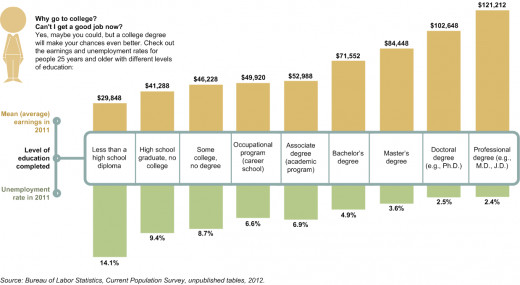
Good Reasons to Attend a College or University
- "I want to invest in my future"
- "I want to gain deeper knowledge in my field of interest"
- "I want to get involved at a university"
If you have one or more of these reasons in mind... chances are high that you are on the right track!

Pre-College Checklist
- Do a cost benefit analysis; remember, college will probably take up 4 to 5 years of your life as well as a whole lot of money!
- Do your research! You might think you want to be an engineer, but do you really know what all is involved in being an engineer?
- Find out what you want to do before enrolling, this is so that you can spend your time in college focusing on developing your area of future expertise!
- Look for scholarships and apply for financial aid!
- Hone your study skills, you will need them!
- And last but not least, have a well-written and well-developed plan!

Need Career Ideas?
In my opinion, around 80% of the responsibilities of most jobs are specific to the company you work for. Meaning that, even after you have earned a degree, learning never stops!!! Also, it means that, you won't be using all the knowledge that you gaining in college every day for the rest of your life... which is kind of nice! However, the more you can fall back on what you learned in college, the more valuable your college education will become. And the more you can use that knowledge, the more you will remember it! Therefore, it is imperative to choose the area of study that will best benefit you in the future. And the first step to choosing an area of study is to find a profession that interests you.
- Take a career placement test
- Volunteer to gain experience
- Use the internet; you know you are already on it all the time anyways!
Taking a career placement test could help point you in the right direction as well as expose professions that were previously unknown to you. Some career placement tests can be completed online, here is an example. Also, volunteering is great for gaining experience in different areas, so that you know what you are getting into. For example, many young people want to be veterinarians; who does not want to be around cute fluffy animals all day? However, after completing their volunteer time at a veterinary hospital, most change their mind because there is a lot more to being a veterinarian than being around cute fluffy animals!
Use the internet to your advantage; the Bureau of Labor Statistics website (www.bls.gov) is a great resource if you want to get a brief overview of different professions.
After you have picked out one or more ideas, ask yourself these questions:
- How can I benefit humanity with the knowledge I will learn from this area of study?
- Will I be happy in this profession long term?
- Does this profession have a good outlook with respect to future growth and development?
Once you have a profession in mind, it is normally easy to determine which degree is best to pursue. However, if you still need help, consider talking with a career adviser!

What about Online Colleges?
Today, people’s philosophy toward education has changed. Many simply want to have some sort of degree behind their name. Many online colleges have sprung up to meet this desire, advertising that “you can get a degree in as little as two years!” I am not saying that these programs are not accredited; however, I do believe that there is a problem when colleges are attracting students by advertising their short graduation time-frame and affordability instead of the education that their institution imparts. With the goal of “getting people in and getting them out”, online colleges are nothing more than businesses. The sad part is that, through this process, the value of a college degree has declined.
It is worth noting that the above does not apply to every single online college! However, it is rare to find an online college that provides anything close to what a brick and mortar college or university can, for reasons I will discuss later on.
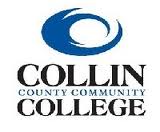
I Recommend Starting at a Community College
- Community college allows students to experience a college workload and therefore helps students make a smooth transition from high school to a college or university
- Community colleges often have a dual-credit program, which allows young students to take college classes before graduating from high school. These classes earn both high school and college credits!
- Because of my good grades at community college, I was automatically eligible for a $5,000 “transfer scholarship” from the university where I attend. Definitely something to consider!
- Community colleges have much better costs per credit hour; I paid $35 per credit hour at my community college. However, I now pay around $230 per credit hour at my university. And that does not even include all the other student fees, which can add over $1,000 to tuition costs!!!
- Community colleges often have a lot of the same resources as a university, such as free help/tutoring centers, a library, and a gymnasium
- Community colleges have smaller class sizes, see below
The average class size at my community college was about 30 people; however, at the university it is not unusual for the class size to be around 100. I can tell you from personal experience; it is good to start out with the smaller class size!
Many students want to go straight to a college or university, and that is understandable. However, completing at least the core classes at a community college is extremely beneficial. Remember, the core classes are the SAME EXACT CLASSES no matter where you take them, only the cost varies!
Amount of Credit Hours to Take per Semester
While college is a great place, I doubt you will want to be there forever! It normally takes the completion of 130+ credit hours to complete a degree; the more hours you take per semester, the quicker you will be done. Not only does a full course load save time, it also saves money because the more hours taken per semester the lower the cost per credit hour. A full course load normally equals 12 or more credit hours; personally, I take 15-16 hours per semester and that works quite well for me. Most classes equal three credit hours; however, some classes only equal one, while others can equal four to five. To clarify, taking 15 hours does not necessarily mean that you will be in class 15 hours each week, but it could! During the spring and fall semesters, most classes meet twice per week (normally on Monday/Wednesday or Tuesday/Thursday) and each class lecture normally lasts an hour and a half. As I will discuss later on, plan on studying for around an hour and a half for every hour you are in class!

Paying for College
A college or university education costs anywhere from $30,000 (much less if classes were taken at a community college) to well over $100,000. If you attend a public college or university, your tuition per semester will probably be around $5,000 (if you are taking a full load). And private colleges cost much more per semester. Obviously, few students can pay this kind of money out-of-pocket. However, there are several ways for students to attend college even if they or their family cannot afford it.
- Scholarships (Merit-based aid)
- Financial aid (need-based aid)
- Student loans
Scholarships are monetary awards given to scholars who have proved that the care about their education, and they are definitely the best way to go when it comes to paying for college! However, they require a lot of self-motivation, diligence, and perseverance. Different scholarships have different requirements; my brother has won several scholarships for public speaking, and I have won several because of my GPA. However, most scholarships require an essay submission. Therefore, it is beneficial to have good writing skills when applying for scholarships. Also, it helps to have someone (a parent or teacher in the best scenario) review your essay(s) for changes or corrections that should be made. Scholarships vary in amount; for example, Coca-Cola offers fifty $20,000 scholarships; however, most scholarships are not worth that much. No matter the case, scholarships are definitely worth considering because no matter how much you receive, it is free money! And foundations, colleges, businesses, and organizations love giving that money away to people who care about their education! When applying for scholarships, you will be competing against numerous other young individuals; therefore, take the time to put in your best effort!!! Continuously search for scholarships; and when you find one, start working on it long before the application submission deadline.
I have found several good ways to find scholarships:
- Knowing your future career path will help you discover scholarships; many companies want to support young people entering their industry.
- Libraries are always good resources; there are actually scholarship directory books that list hundreds of scholarships, including scholarships for left-handed people!
- Colleges and universities (including school affiliated foundations, alumni, academic societies, sororities, and fraternities) are also good scholarship sources.
- I do not recommend the internet as a good scholarship resource because too many people are already scouring it for scholarships and many of the good scholarships are not even listed online. However, if you decide to use the internet, www.fastweb.com is a good resource.
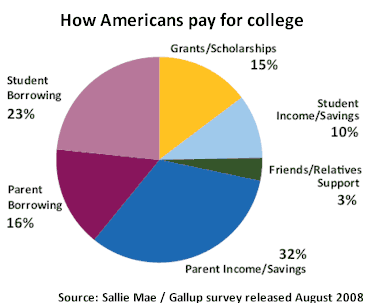
There are several common sources of need-based financial aid:
- state governments
- the national government
- colleges/universities
It is important to research your state’s specific financial aid policy. Primarily, financial aid goes to students whose parents (or themselves) earn below a certain amount of money each year. The money received is normally referred to as a “grant”. Grants do not have to be re-paid, UNLESS you do not complete your degree. If your family is well-off, you still may be eligible for financial aid! Therefore, I believe that it is a good idea for all students to apply for financial aid; again, it is free money! The application for Institutional, State, and Federal aid is called the FASFA (Free Application for Student Federal Aid); and it can be filled out online here. Make sure you submit your FASFA before the deadline!!!
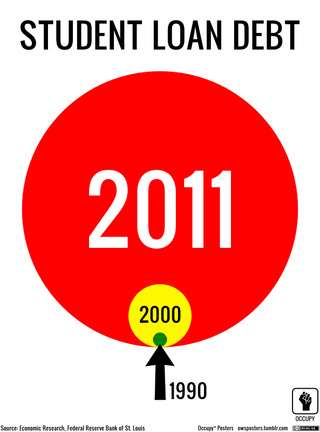
Like financial aid, many student loans come from the government. Therefore, interest rates on these loans fluctuate based on politics and the economy. I do not recommend getting into debt while paying for college; therefore, I only recommend using student loans as a last resort! I have heard quite a few of my fellow students talk about their student loans, and nobody seems to have had a good experience with them. If you must take out a student loan, do a lot of research and develop a plan to pay back the loan as soon as possible! Here is a good tool for developing a loan repayment plan.
In-College Checklist
- Get involved (both in-class and out-of-class)!
- Make new connections (with students, professors, prospective employers, and researchers)
- Join an academic society
- Inquire about research opportunities
- Get an internship, if possible. The experience that can be gained from an internship can be VERY valuable for your future!
- Do not treat your college education as something to “get over with”!
- Avoid alcohol/partying in excess
- Try to take a full course load
- Develop a schedule for your semester that includes all the important dates from your class syllabuses. This will help you keep track of important homework due-dates and tests!
At the end of the day, those who are involved at their college or university have a better experience and are able to make a better looking resume (which stands out to employers!) than those who are not. And in my opinion, people who do not get involved are wasting their time because they might as well buy the textbooks and learn the information without attending college.
Education is something that many people in the world never have the chance to receive.
College has a large bearing on your professional career; and your professional career lasts for the majority of the rest of your life! Therefore, put in your best effort; take advantage of each moment, time is too precious to waste!

Study Tips
I am including this section because I know a lot of students struggle with anxiety (which can be caused by many things in college). And when I say struggle, I mean STRUGGLE! I truly feel sorry for those with anxiety issues. While anxiety is biological and physiological to an extent, I firmly believe that adding some structure will allow students to feel more in control, and therefore lessen their anxiety. I cannot promise to cure anxiety; however, it seems as though lessening it by any amount would be worth it.
First, ask yourself this: "Would I like to take all day to study, or would I rather get my studying done quickly so that I can have some time to do something fun?"
Studying is a huge part of college, or at least it should be; and If you want to be successful in college, studying is necessary! By virtue of personal experience, I have compiled some tips for those hoping to increase their study skills. Increasing these skills will help you both avoid procrastination and complete tasks in a timely and organized fashion! And who doesn't want that!?
- For every hour you are in class, expect to spend at least an hour and a half (it depends on the class) studying or working on homework.
- Plan your day in advance! I recommend using the task planner on your phone because it lets you assign specific times for each task; and, if you are like most college students, you probably keep your phone with you AT ALL TIMES...
- Prioritize your classes.
- Wake up early in order to get a good start, this will help you feel accomplished as the day goes on.
- Take notes in class, this will help you remember what is said in class. And what is said in class is more important come test time than textbook content.
- Take notes as you read through the textbook. This takes time; however, it is worth it when you realize how much it increases your memory!
- When studying, time yourself. At first, try to focus for 15 minutes. Then, gradually increase the time until you reach an hour. This will help give you goals and keep you focused!
- Take timed breaks. Giving your mind a break will help you stay awake and efficient! I recommend taking 10-15 minute breaks.
- Evaluate different study environments. If you feel like you are not getting much done in your dorm/apartment (possibly because of too many distractions), try the library! I have found that studying in the library works wonderfully.
- Reward/reinforce good study habits!
- Allow yourself to feel accomplished
- Plan fun events AFTER you have completed your homework/studying. Your life should revolve around your education, not the other way around!
- Make friends in your classes that strive to succeed; form a study group if possible.
- Last but not least, keep it in prospective! Studying should not be a chore.
When planning, be specific. If you are not specific enough, you will spend too much time figuring out what to do, you will not have any sense of urgency until the last minute (procrastination), and you will most likely become overwhelmed and your day will be wasted. Therefore, planing such as “Wednesday looks free, I’m sure I will get a lot done because I have all day to study”, are not the best way to go. A much better example would be something more like, “From 7:00-9:00, I will study my biology textbook”.
I also recommend putting a lot of effort into studying for the first midterm test in each of your classes, this includes actually READING the textbook (I know, it's a revolutionary idea!). After the first test, you will have a good feel for how your teachers write their tests and also for what you have to study for each class in order to get good test grades. And at that point, you will be able to prioritize your classes. For example, if you are lucky enough to have a teacher that writes tests based off PowerPoint presentations, you probably won't have to spend very much time studying for that class. However, if you discover that another teacher writes tests based off of the textbook, you will have to spend a lot of time studying for that textbook. In the end, it normally balances itself out quite nicely.
Not only will these tips help you with studying effectively and efficiently, they will also help your overall organization and peace-of-mind!
The goal is to find a balance between “having a life” and school, because both are important!

To Work or not to Work? That is the Question...
Many students feel pressured to work in college (and some simply have to). There is nothing wrong with wanting to make some money while you are in college; however, do not let a job become a higher priority than your education. Look at it this way, if you let your job take away from your education, it can keep you from getting a more professional job after you graduate. You are spending a lot of time and money to attend college, do not let a job that makes you $9.00 an hour hinder you from getting a job that will make you $25.00 an hour after you graduate. Therefore, keep it part-time (even when it may be tempting to go full-time!). In my opinion, 10 to 20 hours per week is a good amount. I have been able to work 1 - 2 part-time jobs while taking 15 hours. However, I do not recommend this to freshmen! Give it some time, at least until you discover what you can comfortably handle!
Another thing to think about is a little thing called "inflation"... When I started working, minimum wage was $5.75 an hour. Now, it is $7.25 an hour; and soon, it will probably go up to $9.00 an hour. I hate to say this, but the hours you clock as a student will be virtually worthless in a few years. As a student, your priority should be to invest in your future; and a job is not the best way to provide for your future. Think of a student job as a supplemental income that you can use to pay for college expenses. In my experience, evening jobs are best (such as waiting tables). Also, it may be a good idea to inquire about any work-study programs at your college or university. Work-study programs pay above minimum wage and have a flexible (and therefore student-friendly) schedule. However, the best situation would be to find a job that gives you experience in your field of interest!
Most Importantly...
Think of your career as a something you can create! The more effort you put into preparing for your future career now, the more you will be rewarded later on.
Look for experiences, be adventurous, ask questions, be creative, and be smart! Explore all your options, and stay alert for doors to open!
Thank you for reading; I hope you found this information beneficial!








